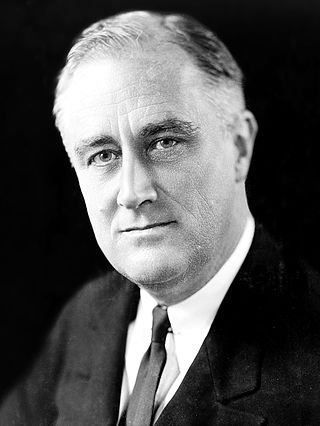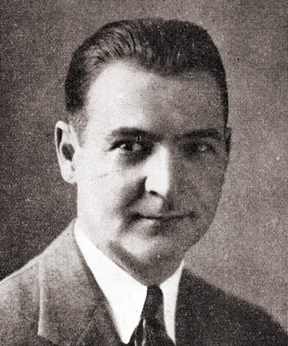
The 1932 United States presidential election was the 37th quadrennial presidential election, held on Tuesday, November 8, 1932. The election took place against the backdrop of the Great Depression. The incumbent Republican President Herbert Hoover was defeated in a landslide by Democrat Franklin D. Roosevelt, the governor of New York and the vice presidential nominee of the 1920 presidential election. Roosevelt was the first Democrat in 80 years to simultaneously win an outright majority of the electoral college and popular vote, a feat last accomplished by Franklin Pierce in 1852, as well as the first Democrat in 56 years to win a majority of the popular vote, which was last done by Samuel J. Tilden in 1876. Roosevelt was the last sitting governor to be elected president until Bill Clinton in 1992. Hoover became the first incumbent president to lose an election to another term since William Howard Taft in 1912, and the last to do so until Gerald Ford lost 44 years later. The election marked the effective end of the Fourth Party System, which had been dominated by Republicans. It was the first time since 1916 that a Democrat was elected president.

The mayor of New York City is elected in early November every four years, in the year immediately following a United States presidential election year, and takes office at the beginning of the following year. The city, which elects the mayor as its chief executive, consists of the five boroughs, which consolidated to form "Greater" New York on January 1, 1898.

The Democratic Party of Guam is a political party in Guam affiliated with the U.S. Democratic Party. Its origins lie in the Popular Party, which was the only political party on Guam until 1956.

The mayoral election of 2007 in Pittsburgh, Pennsylvania was a special election held on Tuesday, November 6, 2007. The incumbent mayor, Luke Ravenstahl of the Democratic Party faced Republican challenger Mark DeSantis, a telecommunications executive and adjunct professor at Carnegie Mellon University. The race was notable for the strength of its Republican challenger, rare in Pittsburgh, and the election of such a young mayor, Ravenstahl being 27 years old at the time. Ravenstahl was elected with a comfortable margin in an election marked by unusually cold weather but record voter turnout.

The 1938 New York state election was held on November 8, 1938, to elect the governor, the lieutenant governor, the state comptroller, the attorney general, two U.S. Senators and two U.S. Representatives-at-large, as well as all members of the New York State Assembly and the New York State Senate. The 1938 election was the first election where the Governor of New York was elected to a four-year term, rather than a two-year term.

The 1917 New York City mayoral election replaced sitting mayor John P. Mitchel, a reform Democrat running on the Fusion Party ticket, with John F. Hylan, the regular Democrat supported by Tammany Hall and William Randolph Hearst.
The following table indicates the party of elected officials in the U.S. state of Maine:

Pittsburgh held a mayoral election on November 3, 2009. Incumbent mayor Luke Ravenstahl, a Democrat, defeated his two independent challengers by a wide margin. The 2009 election was the first regular-cycle election in which Ravenstahl participated; he was originally appointed as an interim mayor to succeed Bob O'Connor and subsequently won a special election in 2007.

The 2010 New York state elections took place on November 2, 2010. Due to the special election for US Senate, all of New York's six statewide offices were up for popular election on the same date. At the same time, all 29 members from New York of the U.S. House of Representatives, all 212 members of the New York State legislature, and many other local officials were elected.

The Mayoral election of 1933 in Pittsburgh, Pennsylvania was held on Tuesday, November 6, 1933. In a realigning election, Democrats regained control of the mayor's office for the first time in twenty-eight years; they have not relinquished this position since.

The Chicago mayoral election of 1991 resulted in the re-election of incumbent Democrat Richard M. Daley to his first full-term. Daley had previously been elected to serve the remainder of Harold Washington's unexpired term in a special election held following Washington's death in office.

The 1979 Chicago mayoral election was first the primary on February 27, 1979, which was followed by the general on April 3, 1979. The election saw the election of Chicago, Illinois' first female mayor, and the first female mayor of any major American city, Jane M. Byrne. Byrne defeated Republican Wallace Johnson by a landslide 66 percent margin of victory, winning more than 82 percent of the vote. Byrne's 82% of the vote is the most any candidate has received in a Chicago mayoral election.

The 1951 Philadelphia municipal election, held on Tuesday, November 6, was the first election under the city's new charter, which had been approved by the voters in April, and the first Democratic victory in the city in more than a half-century. The positions contested were those of mayor and district attorney, and all seventeen city council seats. There was also a referendum on whether to consolidate the city and county governments. Citywide, the Democrats took majorities of over 100,000 votes, breaking a 67-year Republican hold on city government. Joseph S. Clark Jr. and Richardson Dilworth, two of the main movers for the charter reform, were elected mayor and district attorney, respectively. Led by local party chairman James A. Finnegan, the Democrats also took fourteen of seventeen city council seats, and all of the citywide offices on the ballot. A referendum on city-county consolidation passed by a wide margin. The election marked the beginning of Democratic dominance of Philadelphia city politics, which continues today.

The 1955 Philadelphia municipal election, held on Tuesday, November 8, involved contests for mayor, district attorney, all seventeen city council seats, among other offices. Citywide, the Democrats took majorities of over 130,000 votes, continuing their success from the elections four years earlier. Richardson Dilworth, who had been elected district attorney in 1951, was elected mayor. Victor H. Blanc, a city councilman, was elected district attorney. The Democrats also kept fourteen of seventeen city council seats, losing one district seat while gaining another, and kept control of the other citywide offices. The election represented a further consolidation of control by the Democrats after their citywide victories of four years earlier.

Dwight R. Winter was an American politician and the 39th Mayor of Springfield, Massachusetts, and was the son of Springfield's 25th mayor, Newrie D. Winter. Winter ran on the Democratic ticket against Republican candidate Carlos B. Ellis. The 1929 campaign was his second; he had unsuccessfully run against incumbent mayor Fordis C. Parker in 1927. He won the election with 17,456 votes, compared to 15,350 for Ellis.

The 1925 Pittsburgh mayoral election was held on Tuesday, 3 November 1925. It resulted in a landslide victory for Republican candidate Charles H. Kline.

In the Chicago mayoral election of 1935, incumbent Interim Mayor Edward J. Kelly defeated Republican Emil C. Wetten and independent candidate Newton Jenkins by a landslide 60% margin of victory.

The 1921 Pittsburgh mayoral election was held on Tuesday, November 8, 1921. Republican nominee William A. Magee was elected by a large margin over Democratic candidate William N. McNair.

The 1909 Pittsburgh mayoral election was held on Tuesday, February 16, 1909. Republican nominee William A. Magee was elected mayor of Pittsburgh over Civic Party and Prohibition candidate W.H. Stevenson and Democratic candidate George R. Herst.

Beginning shortly after the city's incorporation as a city in 1846, elections have been held in the mayor of Manchester, New Hampshire. The following article provides information on the elections for mayor in the city during the 20th century.














